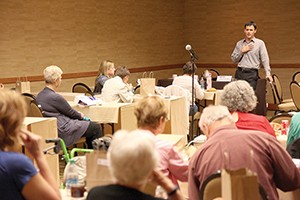
Experts met with patients and family members during Saturday’s ATS PAR Forum.
Saturday’s ATS Public Advisory Roundtable (ATS PAR) gave patients and family members the opportunity to spend a half-day meeting with experts in pulmonary, critical care, and sleep medicine, and the popularity of the forum is catching on. Attendance increased to 248 this year from 190 at ATS 2014.
The Meet-the-Experts forum featured insightful talks on “Lungs and Environmental Health” during the morning. Participants then met with disease experts in breakout sessions focusing on pulmonary hypertension, lipoarabinomannan/tuberous sclerosis, sarcoidois, scleroderma, pulmonary fibrosis, rare lung diseases, children’s interstitial lung disease, and Alpha-1.
The program resonated with Marj Korn, of Arvado, CO, who was diagnosed with idiopathic pulmonary fibrosis in 2011. She says she appreciated the awareness she gained about her disease, current research, and how better to live her life.
“Many other people really care and want to find solutions to diseases that affect the lives of others. I thought it was fabulous,” she says.
Now in their 30s, twins Candice and Crystal Sipe were diagnosed with Hermansky-Pudlak Sydrome when they were 13. Because they live in Arizona where air quality is poor, Candice says she was fascinated by the air quality presentations. Crystal says she appreciated the tips to help her overcome her irregular sleep patterns. Both have attended the last four forums and plan to attend ATS 2016 in San Francisco.
Meet-the-Expert Moderator Teresa Barnes has lost five family members to pulmonary fibrosis. Beyond giving patients the power to improve their lives, the ATS PAR event gives family members and caregivers a renewed understanding of what their family members go through, says Ms. Barnes, past chair of ATS PAR and vice president of the Coalition for Pulmonary Fibrosis.
“A lot of times, there is a disconnect between a patient and family member or a caregiver. They understand the person has a disease, see them day to day and know the realities of the disease, but sometimes they don’t understand why mom is always tired, why she sleeps more than most people, why she sometimes is irritable, or why she gets anxious and pulls back from the family,” Ms. Barnes says. “For them to talk to experts and understand the reasons people feel the way they do, I think they have a renewed understanding of what their family member is going through and a better relationship as a result.”
The physicians also gained insights from patients, including first-time presenter Rebecca Keith, MD, assistant professor of medicine at the University of Colorado School of Medicine, Aurora.
“It’s exciting because it allows me as a physician to understand what my patients are learning and what they are interested in,” Dr. Keith says. “I spent some time having lunch with patients who have pulmonary fibrosis and learning from them about what it’s like to deal with this disease and how they get through every day. How resilient they are and how they manage to make the best out of each situation and get involved in advocacy groups is really impressive.”
